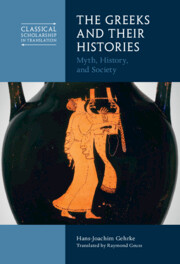Book contents
- The Greeks and Their Histories
- Classical Scholarship in Translation
- The Greeks and Their Histories
- Copyright page
- Contents
- Foreword
- Preface to the German Edition
- Preface
- Note on Abbreviations
- Introduction
- Chapter 1 The Locus of Intentional History
- Chapter 2 Greek Myths As a History of the Greeks
- Chapter 3 Greek Historiography between Past and Present
- Chapter 4 Greek Historiography between Fiction and Truth
- Concluding Perspectives
- References
- Index
Chapter 4 - Greek Historiography between Fiction and Truth
Published online by Cambridge University Press: 01 December 2022
- The Greeks and Their Histories
- Classical Scholarship in Translation
- The Greeks and Their Histories
- Copyright page
- Contents
- Foreword
- Preface to the German Edition
- Preface
- Note on Abbreviations
- Introduction
- Chapter 1 The Locus of Intentional History
- Chapter 2 Greek Myths As a History of the Greeks
- Chapter 3 Greek Historiography between Past and Present
- Chapter 4 Greek Historiography between Fiction and Truth
- Concluding Perspectives
- References
- Index
Summary
Chapter 4 is primarily devoted to the influence of rhetoric on historiography. Here, too, the struggle for truth remains at the center, albeit in a dialectical relationship to the fictional, which Gorgias, the first great theoretician of rhetoric, was already aware of. Since the most important representatives of this new historiographical approach, Ephorus and Theopompus, have only survived in fragments, the first focus is on Isocrates, who was considered their teacher. His handling of history can be analyzed surprisingly clearly, and he shows a closeness to the rational-critical method, not least in his striving for truth and the awareness of the difficulties of searching for it. After a closer interpretation of the above-mentioned historians in this sense, the chapter treats another new tendency of historiography in the Hellenistic epoch. In the so-called tragic historiography, the representation of history again approaches the poetic. The striving for truth is now directed towards the most vivid representation of the real event, as if the recipient had been present at it.
- Type
- Chapter
- Information
- The Greeks and Their HistoriesMyth, History, and Society, pp. 95 - 132Publisher: Cambridge University PressPrint publication year: 2022

